

 |
 |
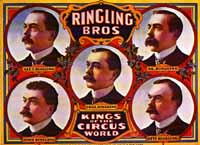
|
The five Ringling brothers were Wisconsin boys. They had the circus in their blood. They never forgot the first show they put on. Young Al broke about every plate his mother owned doing a juggling act. Johnny tried dancing a jig. There was a menagerie too: a few chickens, some rabbits, a billy-goat, and--a horse. The horse's name was Zachary. The boys had bought him from an old veteran of the Mexican War for $8.42. In 1882, when the brothers were older, they took a road tour through Wisconsin with a show they had planned. They started out from Baraboo with fifty dollars among them, and they played at little towns where other showmen would not stop. In 1883 they called their show "The Ringling Brothers Carnival of Fun," and the next year they used the money they had made to start their first traveling circus. Otto always went ahead to make arrangements and put up the advertisements. In one town he couldn't find a lot on which to pitch the tent, and the boys were worried. A man named Mr. Jones had just the right lot, but he guarded it with his life. However, he did like boys. Johnny Ringling, who was only fourteen at this time, went to see Mr. Jones. He explained that he and his brothers had a circus, but had found no place to give it. "We thought that maybe you'd let us use your lot down by the square," he told Mr. Jones. "My lot? You mean my big lot?" asked Mr. Jones. "Yes, sir," said Johnny. "We'd be willing to pay." "Fiddlesticks!" said Mr. Jones. "Save your pennies. You'll need them later. I'll tell you what I'll do, Sonny. If you promise not to harm my trees, I'll let you and your brothers play there." Johnny thanked Mr. Jones and handed him a contract to sign. Mr. Jones laughed. "Business man, aren't you? Well, sir, that's what I like in a boy. There you are. Now run along; I'm busy!" You can imagine the man's feeling the next morning when he saw his lot buried beneath a big tent and circus pennants. He was too angry to speak. At first he would not believe that boys owned the show, but then he saw Johnny. He found out that the trees had been roped off so that no harm would come to them. The brothers showed him that the fence had been carefully taken down so the wagons could go through. They explained that the fence would be carefully replaced. Finally Mr. Jones said, "Well, I guess it's all right. Might as well grin and bear it." By 1886 the circus had almost doubled. By 1888 the competition was worrying the great Barnum. By 1890 the Ringling Circus was so big that it had to be taken from place to place by rail. By 1900 it had no equal. |
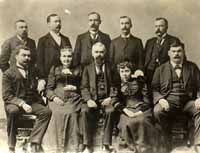 Ringling Family |
 |
||
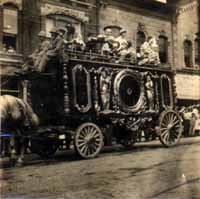 |
Now the "Greatest Show on Earth" makes a tour of eighteen thousand miles and plays in about 150 communities. It is moved on four railway trains which carry two hundred red circus wagons and cages for the hundreds of animals. The president and vice-president of the show have private cars. Headline performers have small staterooms. The others sleep and keep their belongings in open car bunks. Circus people live in groups like big families. Often thirty or forty laborers, or clowns, or show girls, occupy a single car. The big cook house with its crew of 130 serves over 4,000 meals a day. Performers and managers eat at long tables in one half of the tent, workmen in the other half. All eat the same food. |
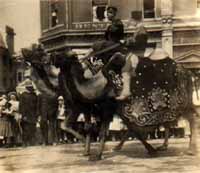 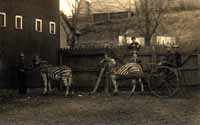
|
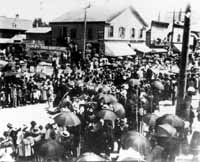 Circus Day in Beaver Dam |
The ten thousand daily customers come to see the midway, the side shows, the menagerie, and the show in the Big Top. On one side of the midway are brightly lighted booths where loud-voiced men peddle things to eat. On the other side is the side-show tent with its bright posters and its noisy announcer. The Big Top has six towering main poles and sixty-one standing side poles. The twelve-ton canvas tent is the largest single tent in the world. Four miles of cable supply light for the arena. The circus could not move without elephants and children. Gangs of boys ten to fourteen years old are offered a general admission ticket in return for work. Usually three hundred such boys spend an interesting day with the circus. They work with midgets, they watch the elephants as they push the heavy wagons with their heads. They see a thousand wonders, and for a few short hours they are a part of the magic that is the circus. |